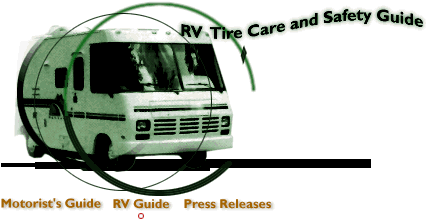Here are guidelines to help you obtain the best performance from the tires used on your recreational vehicle (RV). Unless otherwise specified, the term "RV" applies to motor homes, travel trailers, 5th-wheel travel trailers and slide-in campers for pickup trucks. More information about your specific vehicle and its tires is contained in the owner's manual supplied by the vehicle manufacturer. Additional information concerning your tires is available from your local tire dealer or the tire manufacturer.
Tires used on RVs are subjected to a greater variety of conditions than automobile applications. Many RVs are out of service for long periods of time. When RVs are being driven, they are used at or near maximum loads during hot weather.
Normal, natural aging of a tire, as well as ozone in the air, may cause the rubber to crack, especially in the sidewall area. Tires should be checked for this condition or other damage before every long trip. Tires over five years old or ones that show signs of cracking should be inspected regularly by a tire professional to determine if they should remain in service or be discarded.


